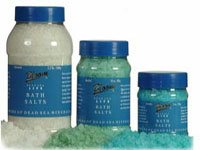Developing Cross-border Trade between Jordan and Egypt
In November 2011, EnACT, the International Trade Centre’s Enhancing Arab Capacity to Trade programme, gathered 40 companies from all 5 member countries to create better market awareness and enhance business opportunities among them. ITC experts created a business matching map and brought buyers and sellers together to discuss potential complementarities, sell to each other and target foreign markets jointly. This regional forum led to several promising business opportunities for participating companies. A few have already done business; one good example is the Bloom-Hegazy partnership, from Jordan and Egypt, which has addressed the factor that has most limited trade between the two countries: non-tariff barriers.
Bloom is a woman-owned company producing a high-quality range of natural and unique Dead Sea products. Headquartered in Amman, Jordan, one of Bloom’s main competitive factors on international markets lies in its operational licenses to obtain raw materials from the Dead Sea for its skin care products. Some 40 employees are the foundation of the company. Beyond gaining a new market, distributing its products in Egypt will also benefit Bloom and its workers in other ways. Thanks to an EnACT networking opportunity in Morocco, and through continuous efforts by Ms. Elham, Bloom’s owner, and the unique vision of Mohamed Hegazy, a young Egyptian trader, the products will very soon be distributed in Egypt, the largest Arab country in terms of population and Jordan’s close neighbour.
Mohamed Hegazy of Egypt’s Hegazy Group first met Ms. Elham during the EnACT organised meeting and networking opportunity in Morocco in November 2011. And he liked what he saw. “I saw the distribution and their certificates, and was really impressed,” says Hegazy. He adds that Jordan has a good image as a country, as do its products, and with the destination very near, “it is close to having a company in Egypt.” While the details of the deal still need to be ironed out, especially in terms of distribution, the Hegazy Group will rely on its product distribution expertise in Egypt to reach out to companies that would like to buy these Dead Sea cosmetic products.
Trade works both ways; now that Mohamed Hegazy has been introduced to Jordan he is considering having a distribution channel in Jordan for his family-owned automotive parts company. He says “Egypt can easily do business with Jordan because it is close, so the idea is to complement each other through trade,” noting that distributing Jordanian cosmetics in Egypt can also help his company sell Egyptian automotive parts in Jordan, as the country does not have an automotive sector of its own.
Bloom has also benefited from marketing and branding workshops offered by EnACT held in cooperation with JEDCO, Jordan’s trade promotion arm. The company has retail, hotel and spa/professional lines, as well as a wide range of gift kits and a bulk line for private labelling. Many Bloom products are made through a network of 250 families throughout Jordan, mainly women who work from their homes. They have been trained to work according to the specific quality demands of the company. When the gift bags, boxes or other packaging is made, it goes through the company’s strict quality control process. Because these accessories are of high quality, the products themselves can command a higher price, raising the incomes of the families that make them. Ms. Elham estimates that 30% of the orders that will come from Egypt will be in the form of gift bags, a substantial increase in the numbers of bags already made, which will also benefit the families.
By promoting regional trade among Arab countries EnACT addresses a key potential area that has been underexploited so far. Since the Arab Spring brought about a new political environment, political leaders have expressed a genuine interest in developing intra-regional trade. EnACT will increase its initiatives in that direction. For example, the programme is now helping Bloom develop further business with a neighbouring country, creating additional employment opportunities for a network of 250 families it employs in Jordan.

